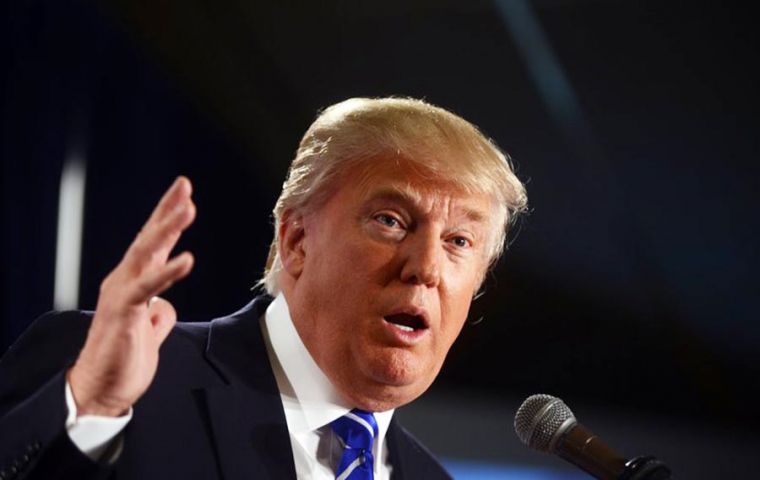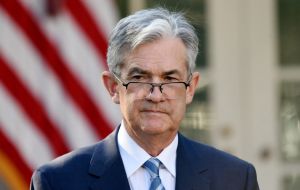MercoPress. South Atlantic News Agency
Trump “not happy” with the Federal Reserve recent interest rate increases
 Donald Trump acknowledged that his comments about the Fed would likely raise concerns
Donald Trump acknowledged that his comments about the Fed would likely raise concerns  The central bank has long been seen as needing to operate free of political pressure from the White House or elsewhere to properly manage interest rate policy
The central bank has long been seen as needing to operate free of political pressure from the White House or elsewhere to properly manage interest rate policy  In February Fed chief Jerome Powell said “we do our work in a strictly nonpolitical way, based on detailed analysis, which we put on the record transparently.”
In February Fed chief Jerome Powell said “we do our work in a strictly nonpolitical way, based on detailed analysis, which we put on the record transparently.” President Donald Trump cast aside concerns about the Federal Reserve’s independence, saying he was “not happy” with the Fed’s recent interest rate increases. Trump told CNBC in an interview: “I don’t like all of this work that we’re putting into the economy and then I see rates going up.”
Last month, the Fed raised its benchmark rate for a second time this year and projected two more increases in 2018. Its rate hikes are meant to prevent the economy from overheating and igniting high inflation. But rate increases also make borrowing costlier for households and companies and can weaken the pace of growth. In particular, the Fed’s most recent rate hikes could dilute some of the benefit of the tax cuts Trump signed into law last year.
The president acknowledged that his comments about the Fed would likely raise concerns. The central bank has long been seen as needing to operate free of political pressure from the White House or elsewhere to properly manage interest rate policy.
The Fed’s dual mandate is to maximize employment and stabilize prices. By maintaining its independence, the central bank can make politically contentious decisions to combat economic challenges, like the huge bond purchases it made after the 2008 financial crisis to help drive down long-term rates to support the economy. That policy drew rebukes from many Republican lawmakers.
In February, Jerome Powell, Trump’s hand-picked choice, became Fed chairman. Last week, Powell said in an interview with the radio program Marketplace that he didn’t expect to face pressure from the White House.
”We have a long tradition here of conducting policy in a particular way, and that way is independent of all political concerns,” Powell said. “We do our work in a strictly nonpolitical way, based on detailed analysis, which we put on the record transparently.”
After Trump’s interview with CNBC was made public, Lindsay Walters, a White House spokeswoman, said the president “respects the independence of the Fed.” “The president’s views on interest rates are well-known, and his comments today are a reiteration of those long held positions, and public comments,” Walters said.




Top Comments
Disclaimer & comment rulesCommenting for this story is now closed.
If you have a Facebook account, become a fan and comment on our Facebook Page!